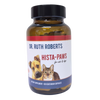Probiotic dog food is becoming more popular with pet owners and veterinarians. Probiotics are good bacteria that help keep a dog’s stomach healthy. A healthy stomach is important for digestion, fighting off sickness, and overall well-being.
But how do you know what signs your dog needs probiotics? This post will help you understand the symptoms, the advantages of probiotics, how to pick the best food, and whether or not your dog might benefit from a probiotic diet.
Understanding Probiotics for Dogs
Probiotics are tiny living organisms that can help keep a dog's stomach and intestines healthy. When dogs eat enough of these good bacteria, they can digest food better, absorb more nutrients, and have a stronger immune system. Probiotics are especially useful after a dog has taken antibiotics, changed its diet, or had tummy troubles. They help bring back the natural balance of bacteria in the gut, keeping the dog feeling its best.
Signs Your Dog Needs Probiotics
Research in Applied Sciences shows that some health issues may be the signs your dog needs probiotics. Here are six signs to look for.

How to Choose the Right Probiotic Formula
When selecting the best probiotic for your dog, there are several important factors to consider. Here are the main factors to consider:
1. Choose the Right Bacterial Strains
Not all probiotics are beneficial for dogs. Look for species-specific strains like:
-
Lactobacillus – Supports digestion and nutrient absorption
-
Bifidobacterium – Helps regulate bowel movements and reduce gut inflammation
-
Enterococcus – Aids in restoring gut balance after illness or antibiotic use
2. Check the CFU Count (Colony Forming Units)
The CFU count tells you how many live bacteria are in a probiotic. A higher CFU count means a more potent product, but the right amount depends on your dog’s specific needs. Your veterinarian can help determine the best dosage.
3. Buy from Trusted Brands
Look for probiotics from well-known and vet-recommended brands. Check customer reviews and ensure the product is backed by research to guarantee quality and effectiveness.
4. Pick the Right Formulation
Probiotics come in different forms, including:
-
Powders and Capsules – Easy to mix with food
-
Chews and Tablets – Convenient and treat-like
-
Probiotic-Enriched Dog Food – Provides daily gut health support
5. Add Natural Probiotic Foods
In addition to supplements, you can boost your dog’s gut health by feeding them natural probiotic foods like:
-
Plain yogurt (without artificial sweeteners)
-
Kefir (a fermented milk drink with probiotics)
-
Fermented vegetables (such as sauerkraut, in small amounts)
Natural Probiotic for Dogs Supplement Recommendation
If you're looking for natural probiotics for dogs, here are some high-quality supplements that support gut health
1. RestorFlora
RestorFlora is a veterinarian-recommended probiotic supplement designed to support digestive health and restore gut balance. It helps treat common stomach problems like bloating, diarrhoea, and digestive distress, which is especially helpful for dogs healing from antibiotic treatments or dietary adjustments.
2. Home Cooked Dog Food
The Original CrockPet Diet is a home-cooked meal plan made from all-natural ingredients. It supports gut health by using fresh, whole foods and avoids artificial additives and preservatives. A balanced and nutrient-rich diet is important for a healthy gut microbiome and works well alongside probiotic supplements.
3. Adored Beast - Love Bugs
Love Bugs by Adored Beast is a high-quality probiotic and prebiotic formula designed to improve digestion, boost immunity, and promote oral health. It contains 14 strains of beneficial bacteria along with prebiotics to promote healthy digestion, boost immune function, and support oral health. With 30 billion CFUs per serving, this cruelty-free and non-GMO formula is a great option for pet owners looking for a natural probiotic supplementation.
4. FidoSpore™
FidoSpore™ is a probiotic mix that helps with digestive health. It contains three types of beneficial bacteria: Bacillus subtilis HU58, Bacillus licheniformis (SL-307), and Pediococcus acidilactici. These bacteria work together to support your gut health and strengthen the gut barrier.
Conclusion
A dog’s health starts with a happy tummy. If there are signs your dog needs probiotics, like tummy troubles, frequent sickness, itchy skin, or low energy, gut balance may be off. Adding natural probiotics for dogs helps improve digestion, boost the immune system, and support overall well-being.















